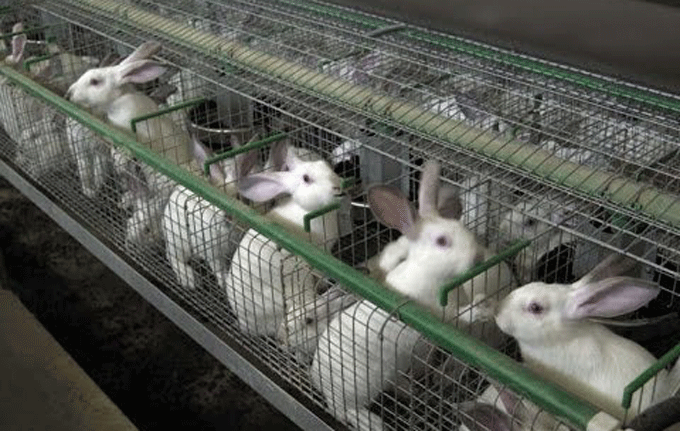
BY MTHANDAZO NYONI
ZIMBABWE’S domestic market for rabbit meat is projected to grow by at least 50% this year on the back of a raft of initiatives set to be unveiled by industry players during the course of the year, a top industry official has said.
The Zimbabwe Commercial Rabbit Breeders Association (Zicorba) secretary general, Siphosethu Ncube Moyo, told the country’s rabbit farmers that the domestic market for rabbit meat was projected to grow by at least 50 % over the next 12 months.
“Our estimation is that between 2,5 tonnes and 3,5 tonnes of rabbit meat is being consumed on the local market per month currently, bringing to about 30 tonnes per year. We expect this figure to increase by about 15 tonnes at the end of 2022,” she said in the sector’s latest newsletter.
“While rabbit meat is currently being sold in major supermarket chains, eateries, hotels and restaurants, we are working with leading industry players to ensure that new innovative ways of marketing rabbit meat are introduced on the domestic market in the coming 12 months. We are very confident that our plans will yield positive results, catapulting rabbit meat into becoming one of the leading meat dishes in the country,” Ncube-Moyo said.
She revealed that Zicorba had been undertaking an incisive analysis of costs across the rabbit meat value chain to ensure that the industry was competitive in juxtaposition with other meats such as pork, chicken, fish and crocodile.
“This study is very important for us to avoid pitfalls that befell some rabbit industries elsewhere that collapsed due to the application of archaic production and marketing approaches which left many farmers deep in the doldrums. We have learnt the importance of involving everyone in the rabbit meat value chain to ensure the success of our industry,” she said.
The association has dispatched some of its top officials to study the export market for rabbit meat in Africa, Middle East and Asia region and there were prospects that Zimbabwe could be exporting rabbit meat before the end of 2022.
- Chamisa under fire over US$120K donation
- Mavhunga puts DeMbare into Chibuku quarterfinals
- Pension funds bet on Cabora Bassa oilfields
- Councils defy govt fire tender directive
Keep Reading
“Before this happens, we would like to ensure that our production is at the level which can sustain both the local and the export markets. For us, this is key and we will soon be engaging with our farmers to ensure that this vision is actualised. We will come up with some incentives for them to produce more,” Ncube-Moyo said.
Meanwhile, Zicorba said the construction of Zimbabwe’s first rabbit meat distribution hub was nearing completion in Harare’s Waterfalls suburb, setting the stage for a sustained growth of cuniculture production in the southern African country.
This follows hot on the heels of the opening in Harare of Zimbabwe’s first rabbit abattoir early this year. The abattoir, which has a capacity to slaughter upwards of 3 500 rabbits per eight-hour shift, is one of the biggest in Africa.
The country’s second rabbit abattoir is planned for Bulawayo next year, which will be followed by the launch of satellite abattoirs in major centres in Zimbabwe.
Rabbit meat producer Raymeg Consultants Private Limited (Raymeg), which owns Zimbabwe’s first rabbit slaughterhouse, is also the sole investor in the country’s rabbit meat distribution hub, which will be the first such facility in Africa.
Raymeg is one of the corporate members of Zicorba. It has interests in agriculture, real estate, strategic communication, leisure and resorts and energy and has operations in a number of countries in southern, eastern and the Horn of Africa.
Raymeg executive director Paidamoyo Nyamakanga said the rabbit meat distribution hub was set to be opened during the first half of 2022.
“We are excited to launch another first in the rabbit industry in Zimbabwe and the Africa region. Our rabbit meat distribution hub naturally complements the rabbit abattoir that we launched recently. It will have the capacity to handle at least 50 tonnes of rabbit meat per month, which will be distributed to major centres in Zimbabwe,” she said.
Nyamakanga said other smaller rabbit meat distribution centres would be opened in main regions of the country soon to complement the satellite rabbit slaughter houses that are planned for these centres.
“We have a very clear strategy of taking rabbit meat to every household in Zimbabwe and of making rabbit production one of the mainstays of Zimbabwe’s agricultural sector. And this we will do in the shortest possible time,” the Raymeg boss said.
Nyamakanga revealed that through its sister company, Raymeg was toying with the idea of launching game-changing initiatives in South Africa, where the rabbit industry has been reeling under the weight of the recent collapse of one of the country biggest rabbit abattoir, which left many producers there in dire straits.
Rabbit farming has significant potential to generate foreign currency through exports. It can also improve food security and nutrition in developing countries.
Zimbabwe’s rabbit industry has been affected by prohibitive pellet costs and lack of quality and affordable breeds.
Now, with more farmers venturing into the industry with government support, the sector is set to grow.










